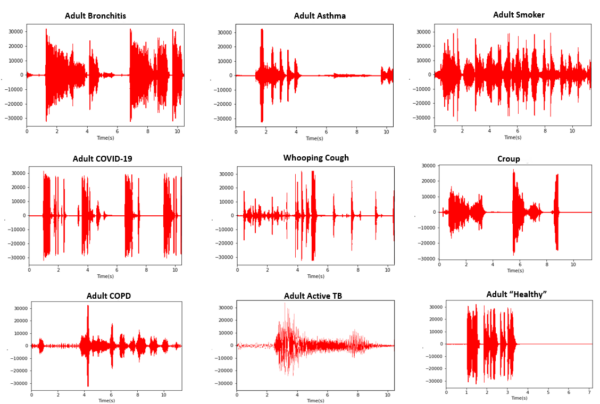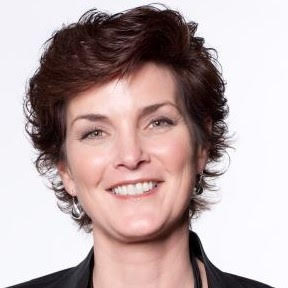 Coughing into your phone sounds germy, but one Denver company aims to make it an easy and cheap way to test for illness.
Coughing into your phone sounds germy, but one Denver company aims to make it an easy and cheap way to test for illness.
“It’s really weird, but the reality is that a cough is this really rich data source,” said Kitty Kolding, the CEO and co-founder of RAIsonance. “Every time you cough for us in one of our apps, we collect about 5,000 data points.”
DTC-based RAIsonance looks to extrapolate those data points using artificial intelligence. Within a minute, consumers will have a potential diagnosis or update on their respiratory condition.
“You cough for about 10 seconds, we capture that recording, push it to the cloud, run it through the process, and about a minute later you get a result,” she said.

Kitty Kolding
The company said it can test for COVID-19 and tuberculosis, but Kolding thinks it will be able to test for up to 20 diseases in the future.
“Think of anything that’s going to attack the human respiratory system,” she said, citing pneumonia, lung cancer and emphysema as examples. With one cough, the app will be able to test for all of those illnesses at once by matching the cough signature to a database full of coughing analytics.
“So it can tell if something has impacted your respiratory system and then it gives you a score that says everything’s fine’ or ‘uh oh,’” Kolding said.
The company said it can also be used as an “early warning system” to track if someone is coming down with an illness. Kolding said RAIsonance is working with eight professional sports teams across the MLB, NHL and NFL, plus several U.S. Olympic teams and collegiate sports programs.
“So what we’re trying to do is make sure which players are struggling, we want those players to stay home and get better and not come in and infect anybody else,” she said.
RAIsonance charges monthly subscriptions ranging between $3 and $8.
“There’s just a monthly fee and you can use it as much as you want,” Kolding said.
The company has little overhead: no manufacturing, no shipping, no expiration dates and no inventory concerns. Just software that is capable of handling 20,000 tests per second.
“None of those things factor into our ability to send tests to a country. Those are irrelevant,” Kolding said. “We have kind of insane scalability. “
RAIsonance works mainly in countries with high rates of tuberculosis. They have, or are in the process of signing, contracts with various governments and nonprofits – including USAID and the Clinton Foundation – to deliver the tests.
They have been conducting field trials for about a year, screening 10,000 people in Ukraine and India. With those wrapping up soon, RAIsonance expects to sell and deploy its technology in the coming years in dozens of nations with high TB rates. The diagnostic tech is also awaiting FDA approval, which Kolding expects to have an answer on in the first half of 2025.
Kolding noted that the current TB testing process is often costly and wasteful. There needs to be multiple forms to confirm a case, she said, which can include expensive methods such as lung imaging or X-rays. She estimated that only 10 percent to 20 percent of those tested come out positive, so up to 80 percent of that testing is uneconomical.
“We’re trying to solve that problem by screening, finding the likely positives, and then letting those people do the rest of the testing to save everybody money, and (do it) much more quickly,” Kolding said.
RAIsonance’s tests cost “pennies,” she said, which is “three or four times” cheaper than the current options. She anticipates saving NGOs and governments on the “billions of dollars” they spend on TB assessments each year.
Kolding founded RAIsonance in March 2020. She was brainstorming a way to help during the outset of the COVID-19 pandemic, and recalled a few colleagues mentioning the ability to detect a disease from a cough sound using artificial intelligence.
“(The science has) been around for a while,” Kolding said. “No one’s done anything with it like we have, but people have been experimenting with this idea for a long time. So we said, ‘Screw it. We’re going to try. We’re going to do everything we can.’ ”
Kolding and her team secured a $250,000 emergency COVID technologies grant from the National Science Foundation, and she hired five recent graduates from the Colorado School of Mines in Golden.
Four of them are still with RAIsonance, which now has around 40 employees between data scientists, engineers and app developers. Though they have outlived the pandemic, RAIsonance has built and trained thousands of models to differentiate between illnesses based on a cough signature alone.
Kolding grew up in the Chicago suburbs before moving to Denver 25 years ago. The University of Illinois graduate has founded and led several tech and data companies, including the Denver-based Infocore and Centennial-based Chrysalis Partners. RAIsonance is the first AI venture for Kolding, who is in her 50s.
The company started breaking even this year, and Kolding said revenue is starting to tick up now and will continue into next quarter, mainly because of all the international testing deals that are being made.
“The cool thing about our stuff is that the second we’re deploying our tests, we’re profitable because our costs are so low,” she said.
RAIsonance has raised $13 million since launching in 2020, and Kolding said she aims to add another $3 million by the end of the year. She noted a few “high-net-worth individuals” who have invested in the company, but two family offices have coughed up the majority of the dough, she said.
 Coughing into your phone sounds germy, but one Denver company aims to make it an easy and cheap way to test for illness.
Coughing into your phone sounds germy, but one Denver company aims to make it an easy and cheap way to test for illness.
“It’s really weird, but the reality is that a cough is this really rich data source,” said Kitty Kolding, the CEO and co-founder of RAIsonance. “Every time you cough for us in one of our apps, we collect about 5,000 data points.”
DTC-based RAIsonance looks to extrapolate those data points using artificial intelligence. Within a minute, consumers will have a potential diagnosis or update on their respiratory condition.
“You cough for about 10 seconds, we capture that recording, push it to the cloud, run it through the process, and about a minute later you get a result,” she said.

Kitty Kolding
The company said it can test for COVID-19 and tuberculosis, but Kolding thinks it will be able to test for up to 20 diseases in the future.
“Think of anything that’s going to attack the human respiratory system,” she said, citing pneumonia, lung cancer and emphysema as examples. With one cough, the app will be able to test for all of those illnesses at once by matching the cough signature to a database full of coughing analytics.
“So it can tell if something has impacted your respiratory system and then it gives you a score that says everything’s fine’ or ‘uh oh,’” Kolding said.
The company said it can also be used as an “early warning system” to track if someone is coming down with an illness. Kolding said RAIsonance is working with eight professional sports teams across the MLB, NHL and NFL, plus several U.S. Olympic teams and collegiate sports programs.
“So what we’re trying to do is make sure which players are struggling, we want those players to stay home and get better and not come in and infect anybody else,” she said.
RAIsonance charges monthly subscriptions ranging between $3 and $8.
“There’s just a monthly fee and you can use it as much as you want,” Kolding said.
The company has little overhead: no manufacturing, no shipping, no expiration dates and no inventory concerns. Just software that is capable of handling 20,000 tests per second.
“None of those things factor into our ability to send tests to a country. Those are irrelevant,” Kolding said. “We have kind of insane scalability. “
RAIsonance works mainly in countries with high rates of tuberculosis. They have, or are in the process of signing, contracts with various governments and nonprofits – including USAID and the Clinton Foundation – to deliver the tests.
They have been conducting field trials for about a year, screening 10,000 people in Ukraine and India. With those wrapping up soon, RAIsonance expects to sell and deploy its technology in the coming years in dozens of nations with high TB rates. The diagnostic tech is also awaiting FDA approval, which Kolding expects to have an answer on in the first half of 2025.
Kolding noted that the current TB testing process is often costly and wasteful. There needs to be multiple forms to confirm a case, she said, which can include expensive methods such as lung imaging or X-rays. She estimated that only 10 percent to 20 percent of those tested come out positive, so up to 80 percent of that testing is uneconomical.
“We’re trying to solve that problem by screening, finding the likely positives, and then letting those people do the rest of the testing to save everybody money, and (do it) much more quickly,” Kolding said.
RAIsonance’s tests cost “pennies,” she said, which is “three or four times” cheaper than the current options. She anticipates saving NGOs and governments on the “billions of dollars” they spend on TB assessments each year.
Kolding founded RAIsonance in March 2020. She was brainstorming a way to help during the outset of the COVID-19 pandemic, and recalled a few colleagues mentioning the ability to detect a disease from a cough sound using artificial intelligence.
“(The science has) been around for a while,” Kolding said. “No one’s done anything with it like we have, but people have been experimenting with this idea for a long time. So we said, ‘Screw it. We’re going to try. We’re going to do everything we can.’ ”
Kolding and her team secured a $250,000 emergency COVID technologies grant from the National Science Foundation, and she hired five recent graduates from the Colorado School of Mines in Golden.
Four of them are still with RAIsonance, which now has around 40 employees between data scientists, engineers and app developers. Though they have outlived the pandemic, RAIsonance has built and trained thousands of models to differentiate between illnesses based on a cough signature alone.
Kolding grew up in the Chicago suburbs before moving to Denver 25 years ago. The University of Illinois graduate has founded and led several tech and data companies, including the Denver-based Infocore and Centennial-based Chrysalis Partners. RAIsonance is the first AI venture for Kolding, who is in her 50s.
The company started breaking even this year, and Kolding said revenue is starting to tick up now and will continue into next quarter, mainly because of all the international testing deals that are being made.
“The cool thing about our stuff is that the second we’re deploying our tests, we’re profitable because our costs are so low,” she said.
RAIsonance has raised $13 million since launching in 2020, and Kolding said she aims to add another $3 million by the end of the year. She noted a few “high-net-worth individuals” who have invested in the company, but two family offices have coughed up the majority of the dough, she said.


